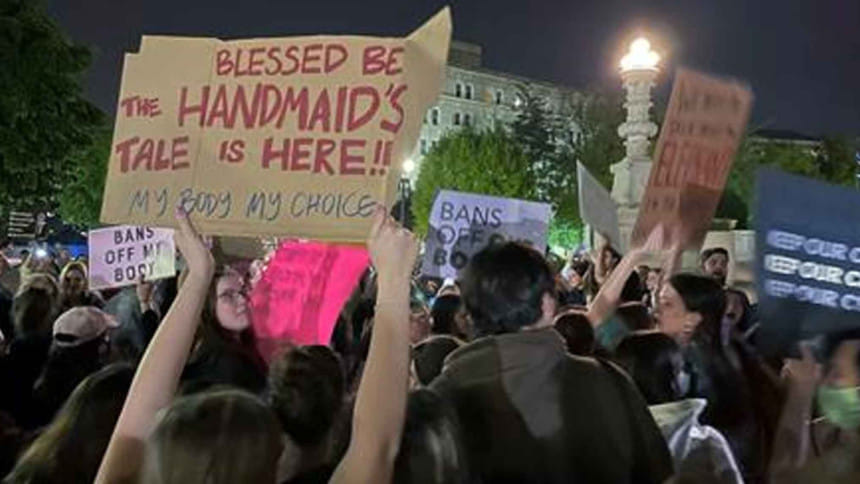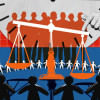Roe v Wade: The (Questionable) March of Progress in the US

People tend to believe in progress. As the decades advance, we become more civilised. We expand important freedoms, like voting rights. We expand safety nets and other benefits so that people don't have to live in horrific poverty. We learn from the mistakes of the past and move steadily towards a better future.
Except that time and time again, some events prove otherwise. Consider the recent US Supreme Court case overturning 49 years of a legal precedent. Women who have been raped (including victims of incest), whose birth control method failed, or who just made a mistake, will now be forced (depending on which state they live in and how much money they have) to carry a pregnancy to term and deliver a baby they perhaps cannot afford to raise and/or did not want. Girls will drop out of school and young women out of university, some never to return. Some women will be unable to work to provide for their families. Many will be physically as well as mentally damaged: pregnancy complications disable 50,000 Americans each year. And given that the US ranks 55th in maternal deaths (the highest among wealthy countries and the only one where the rate is rising), many women will die. Women who have miscarriages will be suspected of murder.
As for the men who impregnate them? If they care about the woman, they too will suffer. If they are rapists, they get off scot-free.
These very same politicians offer cynical responses to the lack of exceptions for the victims of rape. Greg Abbott, governor of Texas, says he will end rape. This despite Texas having the highest number of rapes in the country. Other politicians falsely claim that rape does not cause pregnancy.
Now, you might be thinking: What about those poor unborn children? Sure, the rights of women have been turned back by decades, but foetuses finally have gained rights. Yet, even the Vatican has pointed out the hypocrisy of being against the issue of abortion, but not elsewhere. The same people who are outlawing abortion think it's fine for teenagers to buy assault weapons, for children to be murdered in schools, for people not to have access to the support they need to have a healthy pregnancy and delivery, or for children to thrive. Really want to save babies? How about addressing the infant mortality rate, where the US ranks 50th in the world, and 33rd out of 36 OECD countries? Want fewer abortions? Improve access to sex education and modern birth control. And why do they care about the unborn more than about a 12-year-old girl who has been raped and now must endure a pregnancy and potentially deadly delivery?
Pro-life is really pro-forced birth. It's misogyny.
And the majority of Americans disagree. Depending on how you ask the question, 61-71 percent support legal abortion.
So how did we get here? As I've written before in these pages, we cannot take democracy for granted. The explosion of social media has created an unprecedented danger: vast amounts of misinformation convincing people not to wear masks, not to get vaccinated, that the 2020 election in the US was stolen from the rightful winner, and that an attack on the Capitol was thus justified. That the climate crisis is a hoax. That not pollution, not guns, not the climate crisis, but transgender people are the greatest threat to society.
Republican presidents who lost the popular vote appointed unqualified justices to the Supreme Court, who lied under oath and are now acting based on their personal prejudices and the whims of their corporate friends. And the majority of Americans are powerless to do anything about it. Watching the protests and the creative signs ("You didn't like wearing a mask, imagine being forced to have a baby") is gratifying, but also depressing in its futility.
I can only hope that the absurd lengths to which this court is going, the fact that it has lost its credibility, and that the majority of Americans disagree with many of its decisions, means that positive change will happen eventually.
Meanwhile, this all serves as a useful lesson not to be overly optimistic about the march of progress. Our modern, comfortable lives have created deadly pollution, mass extinctions, and the climate crisis. We cannot solve these problems without acknowledging that the modern is not always better, that sometimes civilisations move in the wrong direction and then collapse, and that the bulwark of democracy and civilisation is active, involved citizens.
Debra Efroymson is executive director of the Institute of Wellbeing, Bangladesh, and the author of "Beyond Apologies: Defining and Achieving an Economics of Wellbeing."

 For all latest news, follow The Daily Star's Google News channel.
For all latest news, follow The Daily Star's Google News channel. 









Comments